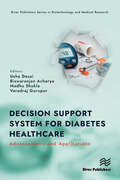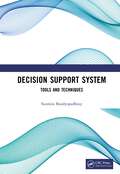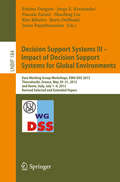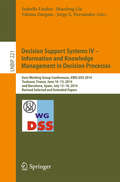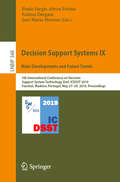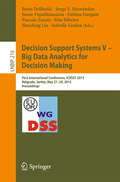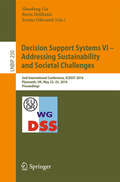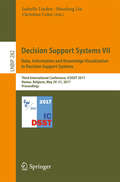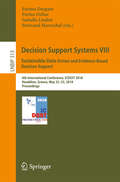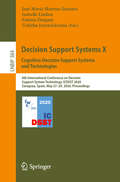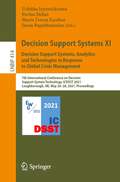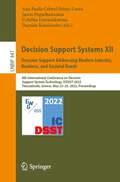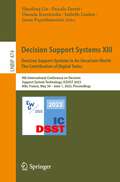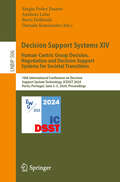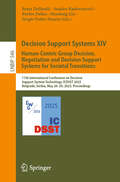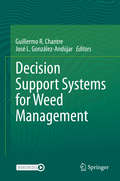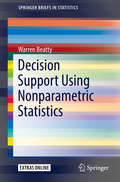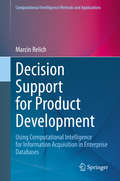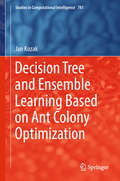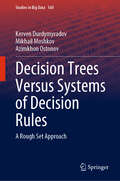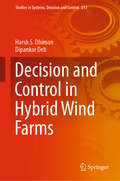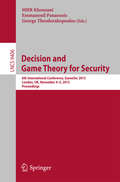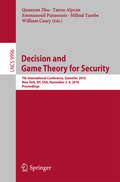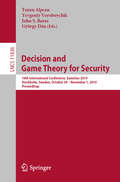- Table View
- List View
Decision Support System for Diabetes Healthcare: Advancements and Applications (River Publishers Series in Biotechnology and Medical Research)
by Varadraj Gurupur Biswaranjan Acharya Usha Desai Madhu ShuklaDecision Support System for Diabetes Healthcare: Advancements and Applications is a comprehensive guide to the cutting-edge technology transforming diabetes management. In this book, leading experts in the field explore how decision support systems (DSS) are revolutionizing healthcare practices, particularly in diabetes care. From advanced data analytics to personalized treatment recommendations, this book delves into the innovative solutions that are reshaping how healthcare providers approach diabetes management. Readers will gain insights into the latest developments in DSS technology, including predictive modeling, machine learning algorithms, and real-time monitoring systems, all designed to enhance patient outcomes and improve quality of life. With a focus on practical applications, Decision Support System for Diabetes Healthcare offers case studies and examples of successful DSS implementations across various healthcare settings. Whether you're a healthcare professional, researcher, or technology enthusiast, this book provides invaluable insights into the future of diabetes care. By exploring the intersection of technology and healthcare, readers will discover how DSS is empowering both patients and providers to make informed decisions, optimize treatment plans, and ultimately, transform the way diabetes is managed on a global scale.
Decision Support System: Tools and Techniques
by Susmita BandyopadhyayThis book presents different tools and techniques used for Decision Support Systems (DSS), including decision tree and table, and their modifications, multi-criteria decision analysis techniques, network tools of decision support, and various case-based reasoning methods supported by examples and case studies. Latest developments for each of the techniques have been discussed separately, and possible future research areas are duly identified as intelligent and spatial DSS. Features: Discusses all the major tools and techniques for Decision Support System supported by examples. Explains techniques considering their deterministic and stochastic aspects. Covers network tools including GERT and Q-GERT. Explains the application of both probability and fuzzy orientation in the pertinent techniques. Includes a number of relevant case studies along with a dedicated chapter on software. This book is aimed at researchers and graduate students in information systems, data analytics, operation research, including management and computer science areas.
Decision Support Systems III - Impact of Decision Support Systems for Global Environments
by Pascale Zaraté Boris Delibašić Jorge E. Hernández Jason Papathanasiou Fátima Dargam Rita Ribeiro Shaofeng LiuThis book contains extended and revised versions of a set of selected papers from two workshops organized by the Euro Working Group on Decision Support Systems (EWG-DSS), which were held in Thessaloniki, Greece, and Rome, Italy, in May and July 2013. From a total of 45 submissions, 15 papers were accepted for publication in this edition after being reviewed by at least three internationally known experts from the EWG-DSS Program Committee and external invited reviewers. The selected papers are representative of current research activities in the area of operational research and decision support systems, focusing on topics such as decision-making using social networks and Web resources; spatio-temporal Web-based decision making; group support systems; technical, legal, and social aspects of decision making; knowledge management and decision support systems; business intelligence and data warehousing; and negotiation support systems.
Decision Support Systems IV - Information and Knowledge Management in Decision Processes
by Jorge E. Hernández Fátima Dargam Shaofeng Liu Isabelle LindenThis book contains extended and revised versions of a set of selected papers from two events organized by the Euro Working Group on Decision Support Systems (EWG-DSS), which were held in Toulouse, France and Barcelona, Spain, in June and July 2014. Overall, 8 papers were accepted for publication in this edition after a rigorous review process through at least three internationally known experts from the EWG-DSS Program Committee and external invited reviewers. The selected papers focus on knowledge management and sharing, and on information models developed to support various decision processes.
Decision Support Systems IV - Information and Knowledge Management in Decision Processes: Euro Working Group Conferences, EWG-DSS 2014, Toulouse, France, June 10-13, 2014, and Barcelona, Spain, July 13-18, 2014, Revised Selected and Extended Papers (Lecture Notes in Business Information Processing #221)
by Jorge E. Hernández Fátima Dargam Shaofeng Liu Isabelle LindenThis book contains extended and revised versions of a set of selected papers from two events organized by the Euro Working Group on Decision Support Systems (EWG-DSS), which were held in Toulouse, France and Barcelona, Spain, in June and July 2014. Overall, 8 papers were accepted for publication in this edition after a rigorous review process through at least three internationally known experts from the EWG-DSS Program Committee and external invited reviewers. The selected papers focus on knowledge management and sharing, and on information models developed to support various decision processes.
Decision Support Systems IX: 5th International Conference on Decision Support System Technology, EmC-ICDSST 2019, Funchal, Madeira, Portugal, May 27–29, 2019, Proceedings (Lecture Notes in Business Information Processing #348)
by Fatima Dargam José Maria Moreno Paulo Sérgio Abreu FreitasThis book constitutes the proceedings of the 5th International Conference on Decision Support Systems Technologies, ICDSST 2019, held in Madeira, Portugal, in May 2019. This year the conference is a EURO mini conference and therefore has a slightly different acronym: "EmC-ICDSST 2019". The EWG-DSS series of International Conference on Decision Support System Technology (ICDSST), starting with ICDSST 2015 in Belgrade, was planned to consolidate the tradition of annual events organized by the EWG-DSS in offering a platform for European and international DSS communities, comprising the academic and industrial sectors, to present state-of-the-art DSS research and developments, to discuss current challenges that surround decision-making processes, to exchange ideas about realistic and innovative solutions, and to co-develop potential business opportunities. The main topic of this year’s conference was “Main Developments and Future Trends”. The 11 papers presented in this volume were carefully reviewed and selected from 59 submissions. They were organized in topical sections named: decision support systems in societal issues; decision support systems in industrial and business applications; and advances in decision support systems’ methods and technologies.
Decision Support Systems V - Big Data Analytics for Decision Making
by Pascale Zaraté Boris Delibašić Jorge E. Hernández Jason Papathanasiou Fátima Dargam Rita Ribeiro Shaofeng Liu Isabelle LindenThis book constitutes the refereed proceedings of the First International Conference on Decision Support Systems Technology, ICDSST 2015, held in Belgrade, Serbia, in May 2015. The theme of the event was "Big Data Analytics for Decision-Making" and it was organized by the EURO (Association of European Operational Research Societies) working group of Decision Support Systems (EWG-DSS). The eight papers presented in this book were selected out of 26 submissions after being carefully reviewed by at least three internationally known experts from the ICDSST 2015 Program Committee and external invited reviewers. The selected papers are representative of current and relevant research activities in the area of decision support systems, such as decision analysis for enterprise systems and non-hierarchical networks, integrated solutions for decision support and knowledge management in distributed environments, decision support system evaluations and analysis through social networks, and decision support system applications in real-world environments. The volume is completed by an additional invited paper on big data decision-making use cases.
Decision Support Systems VI - Addressing Sustainability and Societal Challenges
by Boris Delibašić Shaofeng Liu Festus OderantiThisbook constitutes the refereed proceedings of the Second InternationalConference on Decision Support Systems Technology, ICDSST 2016, held inPlymouth, UK, May 23-25. The theme of the event was "Decision SupportSystems Addressing Sustainability &Societal Challenges", organized by the EURO (Association of EuropeanOperational Research Societies) working group of Decision Support Systems(EWG-DSS). The 15 full papers presented inthis book were selected out of 51 submissions after being carefully reviewed byinternationally experts from the ICDSST 2016 Program Committee and externalinvited reviewers. The selected papers are representative of current andrelevant research activities in various areas of decision supportsystems, such as sustainability and societal challenges; risk management and project portfoliomanagement; business intelligence and knowledge management; and technologies toimprove system usability.
Decision Support Systems VII. Data, Information and Knowledge Visualization in Decision Support Systems: Third International Conference, ICDSST 2017, Namur, Belgium, May 29-31, 2017, Proceedings (Lecture Notes in Business Information Processing #282)
by Isabelle Linden, Shaofeng Liu and Christian ColotThis book constitutes the proceedings of the Third International Conference on Decision Support Systems, ICDSST 2017, held in Namur, Belgium, in May 2017. The EWG-DSS series of the International Conference on Decision Support System Technology (ICDSST) offers a platform for European and international DSS communities, comprising the academic and industrial sectors, in order to present state-of-the-art DSS research and developments, to discuss current challenges that surround decision-making processes, to exchange ideas about realistic and innovative solutions, and to co-develop potential business opportunities. The main topic of this year’s conference was “Data, Information and Knowledge Visualization in Decision Making”. The 13 papers presented in this volume were carefully reviewed and selected from 53 submissions. They were organized in topical sections named: visualization case studies; visualization perspectives; analytics and decision; and Multi-Criteria Decision Making.
Decision Support Systems VIII: 4th International Conference, ICDSST 2018, Heraklion, Greece, May 22–25, 2018, Proceedings (Lecture Notes in Business Information Processing #313)
by Isabelle Linden Pavlos Delias Fatima Dargam Bertrand MareschalThis book constitutes the proceedings of the 4th International Conference on Decision Support Systems, ICDSST 2018, held in Heraklion, Greece, in May 2018. The main topic of this year’s conference was “Sustainable Data-Driven and Evidence Based Decision Support”. The 15 papers presented in this volume were carefully reviewed and selected from 71 submissions. They were organized in topical sections named: decision support systems for a sustainable society; decision support systems serving the public; decision support systems in management and organization; and advances in decision support systems’ technologies and methods. The EWG-DSS series of International Conference on Decision Support System Technology (ICDSST), starting with ICDSST 2015 in Belgrade, were planned to consolidate the tradition of annual events organized by the EWG-DSS in offering a platform for European and international DSS communities, comprising the academic and industrial sectors, to present state-of-the-art DSS research and developments, to discuss current challenges that surround decision-making processes, to exchange ideas about realistic and innovative solutions, and to co-develop potential business opportunities.
Decision Support Systems X: 6th International Conference on Decision Support System Technology, ICDSST 2020, Zaragoza, Spain, May 27–29, 2020, Proceedings (Lecture Notes in Business Information Processing #384)
by Isabelle Linden Fatima Dargam José María Moreno-Jiménez Uchitha JayawickramaThis book constitutes the proceedings of the 6th International Conference on Decision Support Systems Technologies, ICDSST 2020, organised in Zaragoza, Spain, in May 2020. The conference was held online only due to the Corona pandemic. The EWG-DSS series of International Conference on Decision Support System Technology (ICDSST) is planned to consolidate the tradition of annual events organized by the EWG-DSS in offering a platform for European and international DSS communities, comprising the academic and industrial sectors, to present state-of-the-art DSS research and developments, to discuss current challenges that surround decision-making processes, to exchange ideas about realistic and innovative solutions, and to co-develop potential business opportunities. The main topic of this year’s conference was “Cognitive Decision Support Systems and Technologies”. The 13 papers presented in this volume were carefully reviewed and selected from 51 submissions. They were organized in topical sections named: methodological contributions; case studies and applications; and overview (on the current state and future trends of DSS, BI, and data analytics research).
Decision Support Systems XI: 7th International Conference on Decision Support System Technology, ICDSST 2021, Loughborough, UK, May 26–28, 2021, Proceedings (Lecture Notes in Business Information Processing #414)
by Jason Papathanasiou Pavlos Delias Uchitha Jayawickrama María Teresa EscobarThis book constitutes the proceedings of the 7th International Conference on Decision Support Systems Technologies, ICDSST 2021, held during May 26-28, 2021. The conference was planned to take place in Loughborough, UK, and changed to an online format due to the COVID-19 pandemic.The EWG-DSS series of International Conference on Decision Support System Technology (ICDSST) is planned to consolidate the tradition of annual events organized by the EWG-DSS in offering a platform for European and international DSS communities, comprising the academic and industrial sectors, to present state-of-the-art DSS research and developments, to discuss current challenges that surround decision-making processes, to exchange ideas about realistic and innovative solutions, and to co-develop potential business opportunities. The main aim of this year’s conference is to investigate the role DSS and related technologies can play in mitigating the impact of pandemics and post-crisis recovery. The 10 papers presented in this volume were carefully reviewed and selected from 44 submissions. They were organized in two topical sections named: multiple criteria approaches and advances in decision support systems’ technologies and methods.
Decision Support Systems XII: 8th International Conference on Decision Support System Technology, ICDSST 2022, Thessaloniki, Greece, May 23–25, 2022, Proceedings (Lecture Notes in Business Information Processing #447)
by Jason Papathanasiou Uchitha Jayawickrama Ana Paula Cabral Seixas Costa Daouda KamissokoThis book constitutes the proceedings of the 8th International Conference on Decision Support Systems Technologies, ICDSST 2022, held during May 23-25, 2022.The EWG-DSS series of International Conference on Decision Support System Technology (ICDSST) is planned to consolidate the tradition of annual events organized by the EWG-DSS in offering a platform for European and international DSS communities, comprising the academic and industrial sectors, to present state-of-the-art DSS research and developments, to discuss current challenges that surround decision-making processes, to exchange ideas about realistic and innovative solutions, and to co-develop potential business opportunities. The main aim of this year’s conference is to investigate the role DSS and related technologies can play in mitigating the impact of pandemics and post-crisis recovery. The 15 papers presented in this volume were carefully reviewed and selected from 46 submissions. They were organized in topical sections as follows: decision support addressing modern industry; decision support addressing business and societal needs, and multiple criteria approaches.
Decision Support Systems XIII. Decision Support Systems in An Uncertain World: 9th International Conference on Decision Support System Technology, ICDSST 2023, Albi, France, May 30 – June 1, 2023, Proceedings (Lecture Notes in Business Information Processing #474)
by Pascale Zaraté Jason Papathanasiou Shaofeng Liu Isabelle Linden Daouda KamissokoThis book constitutes the proceedings of the 9th International Conference on Decision Support Systems Technologies, ICDSST 2023, held during May 30 – June 1, 2023.The EWG-DSS series of International Conference on Decision Support System Technology (ICDSST) is planned to consolidate the tradition of annual events organized by the EWG-DSS in offering a platform for European and international DSS communities, comprising the academic and industrial sectors, to present state-of-the-art DSS research and developments, to discuss current challenges that surround decision-making processes, to exchange ideas about realistic and innovative solutions, and to co-develop potential business opportunities. The main theme of this year was “Decision Support Systems in An Uncertain World: The Contribution of Digital Twins”. The 21 papers presented in this volume were carefully reviewed and selected from 65 submissions. They were organized in topical sections as follows: DSS models, methods, and tools; DSS for business performance and stakeholders; DSS applications for sustainability in health, energy and transportation; and DSS users and successful adoption.
Decision Support Systems XIV. Human-Centric Group Decision, Negotiation and Decision Support Systems for Societal Transitions: 10th International Conference on Decision Support System Technology, ICDSST 2024, Porto, Portugal, June 3–5, 2024, Proceedings (Lecture Notes in Business Information Processing #506)
by Boris Delibašić António Lobo Daouda Kamissoko Sérgio Pedro DuarteThis book constitutes the proceedings of the 10th International Conference on Decision Support Systems Technologies, ICDSST 2024, held in June 2024. The EWG-DSS series of International Conference on Decision Support System Technology (ICDSST) is planned to consolidate the tradition of annual events organized by the EWG-DSS in offering a platform for European and international DSS communities, comprising the academic and industrial sectors, to present state-of-the-art DSS research and developments, to discuss current challenges that surround decision-making processes, to exchange ideas about realistic and innovative solutions, and to co-develop potential business opportunities. This year the main topic was: Human-Centric Group Decision, Negotiation and Decision Support Systems for Societal Transitions. The 10 full papers included in these proceedings were carefully reviewed and selected from 29 submissions. They have been organized in topical sections as follows: Decision support tools and methods; and decision factors.
Decision Support Systems XIV. Human-Centric Group Decision, Negotiation and Decision Support Systems for Societal Transitions: 11th International Conference on Decision Support System Technology, ICDSST 2025, Belgrade, Serbia, May 26–29, 2025, Proceedings (Lecture Notes in Business Information Processing #546)
by Boris Delibašić Shaofeng Liu Pavlos Delias Sérgio Pedro Duarte Sandro RadovanovićThis book constitutes the proceedings of the 11th International Conference on Decision Support Systems Technologies, ICDSST 2025, held in Belgrade, Serbia, in May 2025. The EWG-DSS series of International Conference on Decision Support System Technology (ICDSST) is planned to consolidate the tradition of annual events organized by the EWG-DSS in offering a platform for European and international DSS communities, comprising the academic and industrial sectors, to present state-of-the-art DSS research and developments, to discuss current challenges that surround decision-making processes, to exchange ideas about realistic and innovative solutions, and to co-develop potential business opportunities. This year the main focus was: Decision Support System Technology in the AI Era. The 10 full papers included in these proceedings were carefully reviewed and selected from 39 submissions. They have been organized in topical sections as follows: Decision support systems; artificial intelligence and machine learning; and decision support system challenges.
Decision Support Systems for Weed Management
by Guillermo R. Chantre José L. González-AndújarWeed management Decision Support Systems (DSS) are increasingly important computer-based tools for modern agriculture. Nowadays, extensive agriculture has become highly dependent on external inputs and both economic costs, as well the negative environmental impact of agricultural activities, demands knowledge-based technology for the optimization and protection of non-renewable resources. In this context, weed management strategies should aim to maximize economic profit by preserving and enhancing agricultural systems. Although previous contributions focusing on weed biology and weed management provide valuable insight on many aspects of weed species ecology and practical guides for weed control, no attempts have been made to highlight the forthcoming importance of DSS in weed management. This book is a first attempt to integrate `concepts and practice’ providing a novel guide to the state-of-art of DSS and the future prospects which hopefully would be of interest to higher-level students, academics and professionals in related areas.
Decision Support Using Nonparametric Statistics
by Warren BeattyThis concise volume covers nonparametric statistics topics that most are most likely to be seen and used from a practical decision support perspective. While many degree programs require a course in parametric statistics, these methods are often inadequate for real-world decision making in business environments. Much of the data collected today by business executives (for example, customer satisfaction opinions) requires nonparametric statistics for valid analysis, and this book provides the reader with a set of tools that can be used to validly analyze all data, regardless of type. Through numerous examples and exercises, this book explains why nonparametric statistics will lead to better decisions and how they are used to reach a decision, with a wide array of business applications. Online resources include exercise data, spreadsheets, and solutions.
Decision Support for Product Development: Using Computational Intelligence for Information Acquisition in Enterprise Databases (Computational Intelligence Methods and Applications)
by Marcin RelichThis book describes how to use computational intelligence and artificial intelligence tools to improve the decision-making process in new product development. These approaches, including artificial neural networks and constraint satisfaction solutions, enable a more precise prediction of product development performance compared to widely used multiple regression models. They support decision-makers by providing more reliable information regarding, for example, project portfolio selection and project scheduling.The book is appropriate for computer scientists, management scientists, students and practitioners engaged with product innovation and computational intelligence applications.
Decision Tree and Ensemble Learning Based on Ant Colony Optimization (Studies in Computational Intelligence #781)
by Jan KozakThis book not only discusses the important topics in the area of machine learning and combinatorial optimization, it also combines them into one. This was decisive for choosing the material to be included in the book and determining its order of presentation. Decision trees are a popular method of classification as well as of knowledge representation. At the same time, they are easy to implement as the building blocks of an ensemble of classifiers. Admittedly, however, the task of constructing a near-optimal decision tree is a very complex process. The good results typically achieved by the ant colony optimization algorithms when dealing with combinatorial optimization problems suggest the possibility of also using that approach for effectively constructing decision trees. The underlying rationale is that both problem classes can be presented as graphs. This fact leads to option of considering a larger spectrum of solutions than those based on the heuristic. Moreover, ant colony optimization algorithms can be used to advantage when building ensembles of classifiers.This book is a combination of a research monograph and a textbook. It can be used in graduate courses, but is also of interest to researchers, both specialists in machine learning and those applying machine learning methods to cope with problems from any field of R&D.
Decision Trees Versus Systems of Decision Rules: A Rough Set Approach (Studies in Big Data #160)
by Mikhail Moshkov Kerven Durdymyradov Azimkhon OstonovThis book explores, within the framework of rough set theory, the complexity of decision trees and decision rule systems and the relationships between them for problems over information systems, for decision tables from closed classes, and for problems involving formal languages. Decision trees and systems of decision rules are widely used as means of representing knowledge, as classifiers that predict decisions for new objects, as well as algorithms for solving various problems of fault diagnosis, combinatorial optimization, etc. Decision trees and systems of decision rules are among the most interpretable models of knowledge representation and classification. Investigating the relationships between these two models is an important task in computer science. The possibilities of transforming decision rule systems into decision trees are being studied in detail. The results are useful for researchers using decision trees and decision rule systems in data analysis, especially in rough set theory, logical analysis of data, and test theory. This book is also used to create courses for graduate students.
Decision and Control in Hybrid Wind Farms (Studies in Systems, Decision and Control #253)
by Dipankar Deb Harsh S. DhimanThis book focuses on two of the most important aspects of wind farm operation: decisions and control. The first part of the book deals with decision-making processes, and explains that hybrid wind farm operation is governed by a set of alternatives that the wind farm operator must choose from in order to achieve optimal delivery of wind power to the utility grid. This decision-making is accompanied by accurate forecasts of wind speed, which must be known beforehand. Errors in wind forecasting can be compensated for by pumping power from a reserve capacity to the grid using a battery energy storage system (BESS). Alternatives based on penalty cost are assessed using certain criteria, and MCDM methods are used to evaluate the best choice. Further, considering the randomness in the dynamic phenomenon in wind farms, a fuzzy MCDM approach is applied during the decision-making process to evaluate the best alternative for hybrid wind farm operation. Case studies from wind farms in the USA are presented, together with numerical solutions to the problem. In turn, the second part deals with the control aspect, and especially with yaw angle control, which facilitates power maximization at wind farms. A novel transfer function-based methodology is presented that controls the wake center of the upstream turbine(s); lidar-based numerical simulation is carried out for wind farm layouts; and an adaptive control strategy is implemented to achieve the desired yaw angle for upstream turbines. The proposed methodology is tested for two wind farm layouts. Wake management is also implemented for hybrid wind farms where BESS life enhancement is studied. The effect of yaw angle on the operational cost of BESS is assessed, and case studies for wind farm datasets from the USA and Denmark are discussed. Overall, the book provides a comprehensive guide to decision and control aspects for hybrid wind farms, which are particularly important from an industrial standpoint.
Decision and Game Theory for Security
by Mhr Khouzani Emmanouil Panaousis George TheodorakopoulosThis book constitutes the refereed proceedings of the 6th International Conference on Decision and Game Theory for Security, GameSec 2015, held in London, UK, in November 2015. The 16 revised full papers presented together with 5 short papers were carefully reviewed and selected from 37 submissions. Game and decision theory has emerged as a valuable systematic framework with powerful analytical tools in dealing with the intricacies involved in making sound and sensible security decisions. For instance, game theory provides methodical approaches to account for interdependencies of security decisions, the role of hidden and asymmetric information, the perception of risks and costs in human behaviour, the incentives/limitations of the attackers, and much more. Combined with our classical approach to computer and network security, and drawing from various fields such as economic, social and behavioural sciences, game and decision theory is playing a fundamental role in the development of the pillars of the "science of security".
Decision and Game Theory for Security
by Tansu Alpcan Emmanouil Panaousis Quanyan Zhu Milind Tambe William CaseyThis book constitutes the refereed proceedings of the 6th International Conference on Decision and Game Theory for Security, GameSec 2015, held in London, UK, in November 2015. The 16 revised full papers presented together with 5 short papers were carefully reviewed and selected from 37 submissions. Game and decision theory has emerged as a valuable systematic framework with powerful analytical tools in dealing with the intricacies involved in making sound and sensible security decisions. For instance, game theory provides methodical approaches to account for interdependencies of security decisions, the role of hidden and asymmetric information, the perception of risks and costs in human behaviour, the incentives/limitations of the attackers, and much more. Combined with our classical approach to computer and network security, and drawing from various fields such as economic, social and behavioural sciences, game and decision theory is playing a fundamental role in the development of the pillars of the "science of security".
Decision and Game Theory for Security: 10th International Conference, GameSec 2019, Stockholm, Sweden, October 30 – November 1, 2019, Proceedings (Lecture Notes in Computer Science #11836)
by Tansu Alpcan Yevgeniy Vorobeychik John S. Baras György DánThis book constitutes the refereed proceedings of the 10th International Conference on Decision and Game Theory for Security, GameSec 2019,held in Stockholm, Sweden, in October 2019.The 21 full papers presented together with 11 short papers were carefully reviewed and selected from 47 submissions.The papers focus on protection of heterogeneous, large-scale and dynamic cyber-physical systems as well as managing security risks faced by critical infrastructures through rigorous and practically-relevant analytical methods.
